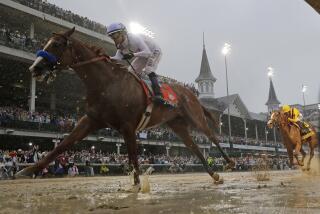King’s Request to Bar Judge From Trial Is Denied : Courts: An appellate court justice suggests, however, that John G. Davies remove himself from hearing the civil suit against the city and police officers.
- Share via
A federal appeals court in San Francisco on Wednesday denied Rodney G. King’s request that U.S. District Judge John G. Davies be prevented from presiding over King’s civil case against the city of Los Angeles and the police officers who beat him.
However, one of the three appellate judges, Stephen Reinhardt, suggested that Davies voluntarily bow out.
Davies’ statements and rulings strongly suggest that he has “expressed firm conclusions regarding the factual issues that are critical to the outcome of King’s civil trial, and that, as a result, his impartiality might reasonably be questioned,” Reinhardt wrote.
Reinhardt stressed that he considered Davies “a fair-minded individual.”
However, “the important point is that there is an appearance that he is possessed of firm opinions regarding the merits of virtually every important factual issue underlying King’s civil claim,” Reinhardt wrote. “Under these circumstances the public might well have cause seriously to question the fairness of the civil proceedings.”
*
By coincidence, Davies was assigned to hear both King’s multimillion-dollar lawsuit and the criminal civil rights case against Sgt. Stacey C. Koon and officers Laurence M. Powell, Timothy E. Wind and Theodore J. Briseno. Koon and Powell were convicted in that case last year. Davies’ comments during sentencing and rulings he made in the criminal and civil cases served as the basis for the removal motion.
Reinhardt and his U.S. 9th Circuit Court of Appeal colleagues ruled that King’s attorneys had not met the burden of proof to disqualify Davies. They upheld an earlier ruling by U.S. District Judge W. Matthew Byrne Jr.
Judges usually are disqualified only for exhibiting bias or prejudice outside the courtroom. However, King’s attorneys contended that Davies should be removed because his courtroom remarks demonstrated “pervasive bias.”
King’s attorney, Victoria E. King, cited several of Davies’ actions, which also were noted by Reinhardt in his opinion. Among them:
* Davies made sympathetic statements about the defendants in the criminal case, including describing them as having “distinguished records of public service,” even though he knew that each had been involved in at least one prior incident involving excessive force and falsification of reports to supervisors.
* Davies excluded evidence of the officers’ racist comments from the criminal trial.
* Davies found that “the incident . . . would not have occurred at all, but for Mr. King’s initial misconduct,” a reference to the fact that King was speeding on the highway and led officers on a chase after they tried to pull him over.
* Davies said that King had “no serious injuries” and that there was only one blow to his head or face (possibly “inadvertent”).
“It is hard to conceive of a factual issue more critical to the damages question” in King’s civil trial “than the severity of King’s injuries,” Reinhardt wrote.
King was struck 56 times during the videotaped March, 1991, beating.
More to Read
Sign up for Essential California
The most important California stories and recommendations in your inbox every morning.
You may occasionally receive promotional content from the Los Angeles Times.













